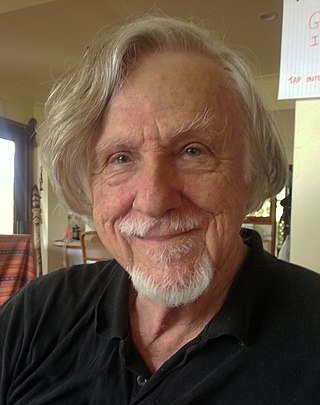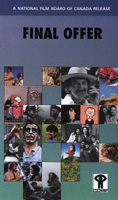
William Norman McLaren, LL. D. was a Scottish Canadian animator, director and producer known for his work for the National Film Board of Canada (NFB). He was a pioneer in a number of areas of animation and filmmaking, including hand-drawn animation, drawn-on-film animation, visual music, abstract film, pixilation and graphical sound. McLaren was also an artist and printmaker, and explored his interest in dance in his films.
Roman Kroitor was a Canadian filmmaker who was known as a pioneer of Cinéma vérité, as the co-founder of IMAX, and as the creator of the Sandde hand-drawn stereoscopic 3D animation system. He was also the original inspiration for The Force. His prodigious output garnered numerous awards, including two BAFTA Awards, three Cannes Film Festival awards, and two Oscar nominations.
The 1st Genie Awards were presented on March 20, 1980, and honoured films released in 1979.
The 2nd Genie Awards were held March 12, 1981, honouring Canadian films released in 1980. The ceremony, which was broadcast live by the CBC, was held at the Royal Alexandra Theatre and was hosted by television host Brian Linehan.
Robin Spry was a Canadian film director, producer and writer. He was perhaps best known for his documentary films Action: The October Crisis of 1970 and Reaction: A Portrait of a Society in Crisis about Quebec's October Crisis. His 1970 film Prologue won the BAFTA Award for Best Documentary.
William Weintraub was a Canadian documentarian/filmmaker, journalist and author, best known for his long career with the National Film Board of Canada (NFB).

Michael Dattilo Rubbo is an Australian documentarian/filmmaker.
Don Owen was a Canadian film director, writer and producer who spent most of his career with the National Film Board of Canada (NFB). His films Nobody Waved Good-bye and The Ernie Game are regarded as two of the most significant English Canadian films of the 1960s.
Colin Archibald Low was a Canadian animation and documentary filmmaker with the National Film Board of Canada (NFB). He was known as a pioneer, one of Canada's most important filmmakers, and was regularly referred to as "the gentleman genius". His numerous honors include five BAFTA awards, eight Cannes Film Festival awards, and six Academy Award nominations.

Final Offer is a Canadian film documenting the 1984 contract negotiations between the United Auto Workers Union (UAW) and General Motors. Ultimately, it provided a historical record of the birth of the Canadian Auto Workers Union (CAW) as Bob White, the head of the Canadian sector of the UAW, led his membership out of the international union and created the CAW.

Grant Munro LL. D. was a Canadian animator, filmmaker and actor. In 1952, he co-starred with Jean-Paul Ladouceur in Norman McLaren's Neighbours. His film, Christmas Cracker, was nominated for an Academy Award in 1965.

Thomas Cullen Daly was a Canadian film producer, film editor and film director, who was the head of Studio B at the National Film Board of Canada (NFB).
John Spotton C.S.C. was a Canadian filmmaker with the National Film Board of Canada.
Mort Ransen was a Canadian film and television director, editor, screenwriter and producer, best known for his Genie Award-winning 1995 film Margaret's Museum.
John Kemeny was a Hungarian-Canadian film producer whom the Toronto Star called "the forgotten giant of Canadian film history and...the most successful producer in Canadian history." His production credits include The Apprenticeship of Duddy Kravitz, Atlantic City, and Quest for Fire.

Albert Kish was a Canadian documentarian/filmmaker.
The 28th Canadian Film Awards were held on November 20, 1977 to honour achievements in Canadian film. The ceremony was hosted by actor Gordon Pinsent.
The 8th Canadian Film Awards were held on August 6, 1956 to honour achievements in Canadian film. The ceremony was hosted by actor Maurice Evans.
The 4th Canadian Film Awards were presented on April 27, 1952 to honour achievements in Canadian film.
Jacques Giraldeau (1927-2015) was a Canadian documentary filmmaker from Quebec. He spent most of his career at the National Film Board of Canada and became known primarily for his films about the history of Quebec as seen through the eyes of its artists. He had a fondness for the avant-garde and many of his films are considered to be experimental.






